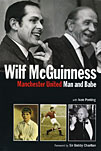 by Wilf McGuinness with Ivan Ponting
by Wilf McGuinness with Ivan Ponting
Know the Score, £17.99
Reviewed by Joyce Woolridge
From WSC 265 March 2009
Roy Keane’s response to his recent managerial difficulties was to grow a patriarchal, piebald beard. At least he could shave it off after a few days. Wilf McGuinness’s hair began to fall out in clumps and turn white when he was “relieved of his duties” at Manchester United and all he could do was briefly sport a trimmed ladies’ wig until an overenthusiastic Greek goal celebration dislodged it. McGuinness could teach Keano a thing or two about stress. As he says in his introduction, football has given him some tremendous highs, but has also “shattered his world” on several occasions.
A schoolboy international, McGuinness was a Busby Babe who could expect a glorious career for United and his country. He lost some of his best friends in the Munich air crash, though a cartilage problem meant he missed the flight. In 1960, aged only 22, he sustained a horrific injury; the sound of both bones in his leg snapping was clearly audible across the pitch. Although he gamely tried to return to the professional ranks – the last time seven years later – his playing days were over. The irrepressible McGuinness, surely one of life’s great optimists, turned to coaching at Old Trafford as an alternative and also later took charge of the England youth team. He reminds us that when he was eventually offered what with hindsight appears the impossible job of succeeding Busby, he was not an inexperienced tyro. Indeed, though Wilf doesn’t say so, it seems that Busby had been long grooming his protege to be his replacement.
Naturally, the most interesting section is that which deals with his unexpectedly brief tenure as United’s manager. It is not McGuinness’s style to speak badly of anyone, so even the most infamous moments, particularly George Best’s afternoon tryst before the third FA Cup semi-final replay against Leeds in 1970, are downplayed in both importance and sensational details. The most damning tale is one frequently repeated as evidence that the young Wilf did not have the strength of personality to impress his authority on players who had been his team-mates. This is the one where a besuited Bobby Charlton (a close friend who wrote the foreword) was supposedly “forced” to do push-ups in the training ground mud as the rest of the squad cringed. Just part of the usual banter, says Wilf, while making perhaps his strongest criticism of anyone in these pages to say that he was not very happy at the time with Alex Stepney’s embroidery of the story in his autobiography, but that things are fine now.
McGuinness was obviously devoted to Busby, and though he admits that it was initially difficult to sort out the demarcation of responsibilities between himself and United’s general manager, this would have got easier over time. Whatever really happened, there is no escape from the fact that Busby rightly would continue to be a presence at Old Trafford, unlike Shankly at Anfield.
A likeable, though rarely revelatory account, this autobiography’s chief strength is that McGuinness’s time at United straddled Busby’s three winning teams, and there are telling personal insights into each. And a terrific story about water pistols which neatly illustrates how the 1960s was altogether a more innocent age.